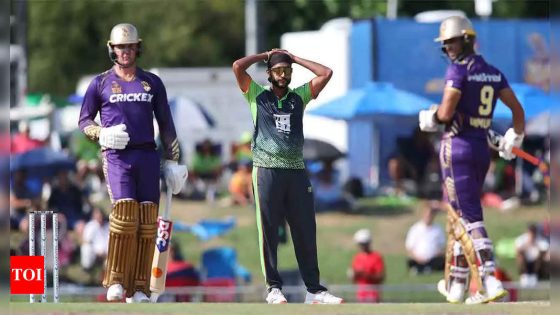Four of the surviving Gweagal spears taken by James Cook and Joseph Banks from the shores of Kamay upon their arrival on April 29 1770 have been returned to the La Perouse Aboriginal Community.
In a repatriation ceremony held at Trinity College, Cambridge in the United Kingdom, members of the La Perouse Community were handed back the spears to safely return them to Country.
Noleen Timbery of the La Perouse Aboriginal Land Council acknowledged the work of Elders to return the spears to their rightful place, and noted their cultural significance.
“They are an important connection to our past, our traditions, and cultural practices, and to our ancestors,” Ms Timbery said.
“Many of the families within the La Perouse Aboriginal Community are descended from those who were present during the eight days the Endeavour was anchored in Kamay in 1770.”
In an emotional ceremony at the College’s Wren Library, Ms Timbery told NITV what it meant to the community to take the spears home again and paid homage to past and future generations.
Ms Timbery was present at the emotional ceremony held at Trinity College’s Wren Library. Credit: NITV
“We know we had Elders working on this for a long time before us, and we appreciate all of their efforts,” said Ms Timbery.
“We’ve got our community behind us, we feel them with us, we feel our Elders around us and our families.
“Bringing [the spears] back, it’s more than about us: it’s about us and everyone who has been involved in the past and everyone who will get benefit in the future.”
Ms Timbery said she hoped other institutions around the world would continue to be open to conversations around the repatriation of culturally significant items.
“We’ve been in a really lucky position where we’ve been able to build relationships with a lot of cultural institutions and we’ve leveraged those relationships to build others,” said Ms Timbery.
“We’ve done that in a really respectful way and we’ve been able to bring those institutions on a journey of their own in understanding that different side of culture.”
David Johnson, a direct descendant of the Gweagal ancestors who used the spears in first contact with James Cook, shared a unique perspective from the shore of that moment in 1770.
Johnson said the Gweagal warriors saw the arrival of the Endeavour through a ‘spiritual lens’ and that in Dharawal culture, contact with the spirit world would result in a spiritual consequence – as such they wanted to prevent the crew from advancing upon the shore.
If they wanted to injure anyone they could have done it with little worry.
“We know through oral history our Old People were interpreting this strange event through our spiritual lens,” he said.
“As the crew advanced on shore, my Old People threw stones trying to discourage the crew,” he said.
Members of the delegation entering the Wren Library for the handover ceremony. Credit: NITV
The Gweagal warriors then began to throw the spears, to discourage the crew further.
Johnson clarified that it was clear this was the extent of his ancestors’ intentions, given the Old People were skilled hunters.
“If they wanted to injure anyone they could have done it with little worry,” Johnson said.
The decision to return the spears comes after a long process of consultation between Trinity College, the Museum of Archaeology and Anthropology (MAA), La Perouse Aboriginal Land Council, the Gujaga Foundation and the Australian Institute of Aboriginal and Torres Strait Islander Studies (AIATSIS) .
Linda Burney, Minister for Indigenous Australians, said it was a significant step towards reconciliation and congratulated the La Perouse community for their decades of work.
“Bringing our history back home provides an opportunity for Indigenous and non-Indigenous Australians, young and old, to build a greater understanding of our shared national story,” Ms Burney said.
The process of returning the spears has taken almost 20 years, after Dr Shayne Williams, an Elder of the Gweagal clan of the Dharawal Nation, began advocating for their repatriation in the early 2000s.
It was this advocacy that forged an ongoing relationship between the La Perouse Aboriginal Community, Trinity College, Cambridge and the Cambridge Museum of Archaeology and Anthropology.
The spears will be displayed at a new visitor centre which is to be built at Kurnell, Kamay. In the meantime, at the request of the La Perouse Aboriginal Community, they will be cared for by the Chau Chak Wing Museum at the University of Sydney.



